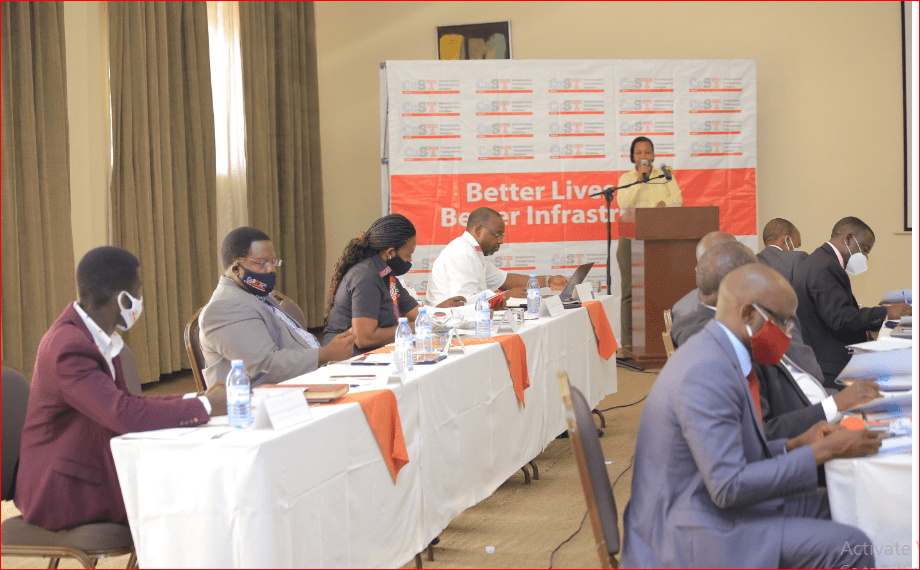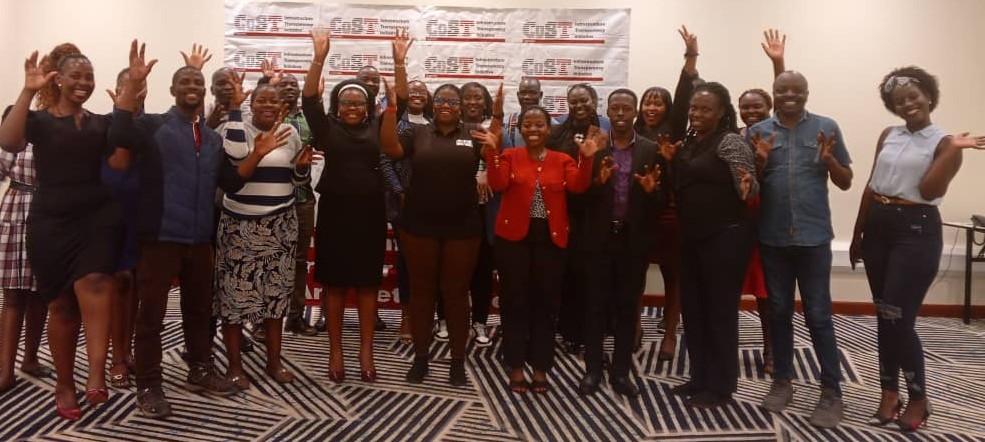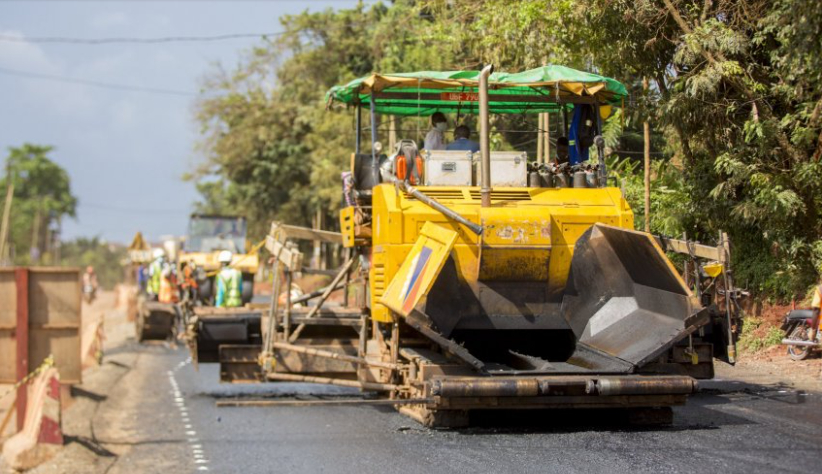
There has been progressive improvement in the level of disclosure for project and contract information on public infrastructure projects. Disclosure has improved from 12 to 20 data points since the 2017 Scoping Study[1] in the CoST Infrastructure Data Standard (IDS) using various open data platforms, and more projects are disclosed quartely, with atleast 449 projects disclosed in 2020 rising from 149 in the year 2019. The national disclosure levels for public infrastructure projects are progressively increasing as observed in the 4th Assurance Process where disclosure increased from 42% in 2019 to 61.5% in the year 2020 across the 23 sampled projects from eight high spending public infrastructure projects worth 4.6 Trillion Uganda shillings. More disclosure enables the private sector to know existing opportunities to engage in, prepare bankable bids and for the general public to engage in monitoring delivery of projects.
In 2017, CoST Uganda conducted a scoping study[2] on eight sampled Procuring Entities. The study revealed that disclosure was very low. Of the 67 data points required for disclosure in the CoST IDS, only 12 data points were legally recognized, but also, of the 12 legally recognized data points, only 20% was disclosed. Low levels[3] of disclosure affect transparency and stakeholder engagement in infrastructure delivery and the private sector is inhibited from engaging in public infrastructure procurement because they lack information on available opportunities. A targeted procurement data analysis conducted by CoST Uganda in March 2020, against set indicators of time and cost overruns, transparency in procurement, project delivery and tender management, revealed that proactive disclosure was low at 49% and 51% was not disclosed. The average bids per tender were 7.3.
Following these findings, CoST Uganda took effort to engage various stakeholders with an aim of increasing transparency and accountability through disclosure. To do so, the programme commissioned various engagement sessions for public officials, the media, private sector and civil society as platforms for stakeholders to engage on issues affecting transparency and accountability. Improved disclosure is a driving factor to fair business practices: when businesses are armed with information they need, they are able to decide which opportunities to engage in. But without such information, they are left at the mercy of engaging in every opportunity in the market, even when they do not qualify.
| Under the Business Integrity Initiative, we aimed to have at least 50 new projects disclosed every quarter for one year. Despite the impact of COVID-19, there was improved disclosure on the Government Procurement Portal, with over 50 new projects disclosed every quarter in 2020. A total of 449 new projects were disclosed during the project life time, surpassing the intended target of 200. |
To this end, we have also recorded an increase in the number of companies engaging in the delivery of public infrastructure projects through their line associations of Uganda Association of Building and Civil Engineering Consultants (UNABCEC) with 200 contracting firms and Uganda Association of Civil Engineering Consultants (UACE) with 34 are consulting firms have engaged with the fair business practices intervention.
Advocacy, influencing action on commitments;
Disclosure has improved, and this is a good sign for Uganda with regards to transparency in public infrastructure procurement processes. This means that progressively more business opportunities are opening up for the private sector, although trends in disclosure levels do change at certain periods of the financial year. Disclosure tends to be high towards the end of the financial year and reporting quarters, and sharply lower at the start of the financial year. This scenario could be attributed to two factors: a general lack of incentives or interest from public officials to publish data, or that there are no projects in procurement at these times to be disclosed. This calls for concerted efforts by all stakeholders, especially oversight bodies, to ensure compliance with timely and consistent disclosure. The entire goal of disclosure is data use, if data is not disclosed on time, then all tools and portals will be useless. “Transparency does not stop at disclosure, it is made of three stones: Disclosure, Data use and Feedback. It is important to note that the tools we are developing are not an end in themselves, but a means to an end, tools do not solve the problems but contribute to the solution, a lot more manual work is needed.” Michael Cengkuru AFIC, Open Data Specialist.
Information disclosure has been the major focus of the Business Integrity Initiative project from the onset. The engagements on the theme have revealed that one of the key issues impeding private sector engagement in infrastructure procurement processes was a lack of information both before and after engaging in the process. Data disclosed has not been consistent with the CoST Infrastructure Data Standard and thus not easy to categorize or analyze. Of the data retrieved for the period January 2018 to January 2020, proactive disclosure was very low at 49%. Projects analyzed had both cost (86%) and time overruns (98%) while 51% of contracts awarded under open competitive methods of public procurement had lower than 3 bids against the required PPDA requirements of atleast 3 bids per tender, meaning that there were unknown factors limiting the participation of private sector in procurement.
In addition, 99% of the contracts awarded were won by local providers – however there was no data verifying which of the 99% were owned by Ugandans and which were local resident firms owned by non-Ugandans – and the majority of the projects were delayed for 3-6 months delayed. The PPDA 2020 Integrity Survey, revealed that 20% of respondents reported to have ever paid a bribe in exchange for an award in public procurement. Corruption and inefficiency in public procurement undermines fair business practices, transparency, competition, citizen participation and timely delivery of public infrastructure projects and value for money. Another issue of contention has been the low levels of inclusiveness of women, young people and considerations for People with Disabilities in infrastructure delivery processes.
Engagements with the lead professional associations for the contractors and consultants revealed that some of the factors affecting the private sector from engaging in procurement included high qualification requirements, and the failure of Government to operationalize the reservation schemes and the local content policy.
| In the words of Dr. Levi Kabagambe, a Director on PPDA’s Board and a Procurement Expert, the E-GP (Electronic Government Procurement) is hoped to strengthen technology for public procurement, including infrastructure procurement: “Disclosure is a function of many things, if Procuring and Disclosing Entities (PDEs) do not disclose data, citizen participation will be affected, and we will not realize an open markets for all firms to engage with fairness and integrity, transparency and accountability may not be realized as well. When E-GP is fully functional, issues of disclosure will be history”. |
Openness is the way to go to realize transparency in infrastructure procurement. Despite the lack of compliance with disclosure requirements as noted in our Data analysis report of August 2020, we are seeing increasing commitments towards increasing transparency in infrastructure procurement processes. Various recommendations were made to Government to improve transparency, including: providing incentives to encourage procurement entities to disclose information; aligning the government disclosure portals to the OC4IDS; identifying factors affecting private sector participation in infrastructure procurement; establishing a platform for addressing integrity issues in public infrastructure procurement processes; establishing a platform for the private sector to engage with Government on ethical issues in public infrastructure delivery processes.
“We need to see all PEs publishing what they planned, procured and implemented. 69.8% of the stakeholders in Uganda agree that corruption influences Procurement according to the IGG report (2012). In addition, the IGG Report reveals that corrupt payments in procurement in Government amounts to 9.4% of the total value of contracts. Corruption is influenced by a lack of ethics and integrity. Lack of ethics and integrity in Public Infrastructure procurement affects competition and Fair Business practices and this puts the citizens to risk resulting from poorly constructed infrastructure. It is important to note that Government through PPDA and DEI – Directorate for Ethics and Integrity is putting in place measures to strengthen Contract Procurement Management, ethics and integrity and mindset change to minimize risks to corruption, I urge CoST Uganda to work with respective Government entities to put in place incentives for entities to disclose information, especially during Assurance”. Mr. David Kiyingi, Commissioner, Procurement Planning and Policy Department, MoFPED.
Following a series of engagements with various stakeholders, UNRA has made special steps towards increasing the level of participation of local firms in the roads sub-sector. The procurements of contracts have been packaged so as to “ring – fence” them for local content: Mechanized maintenance of unpaved and paved roads; Periodic maintenance of paved and unpaved national roads; Low Volume Sealed Roads (LVSR); Swamp improvements; Selected bridge works (short span bridges and multiple box culverts); Labour based maintenance of national roads.
Incentives a resource for increased disclosure;
Rewarding most transparent entities in the Assurance process[4]. To enhance transparency, CoST Uganda through its Champion Ministry of Works and Transport recognized entities that performed best in the 4th Assurance Process. The Uganda National Roads Authority scooped the award for the overall winner in disclosure because they disclosed the highest number of data points, populated public platforms with data, and used official platforms to disclose information while PPDA, the regulator was awarded for promoting Fair Business practices in Uganda, and Ministry of Works and Transport was awarded for its stewardship and promoting the CoST agenda in Uganda. UNRA has obtained Accreditation from PPDA for reservation of selected feasibility study and detailed engineering consultancy services for road upgrading projects to local consultancy firms. Improved dissemination of the performance of the implementation of local content by the Authority and also the available opportunities. This includes the use of the Executive Director’s Pressers, adverts in newspapers, UNRA website and participation in public engagements with industry stakeholders (UNABCEC, UACE, UIPE, and ERB among others). Following the launch of the Assurance report, UNRA updated their website[5] with new information. On their side, KCCA published a new link[6] on their website with updates of all city project information as of February 2021.
The Electronic Infrastructure Monitoring Tool (E-IMT)[7] launched with the support of the BII action has attracted the public attention, both locally, nationally and globally across the CoST countries. The Public launch of the E-IMT[8] attracted CoST International’s eventual documentation of the tool[9] as a key social accountability tool for infrastructure performance. This awareness attracted DFID Embassy of DRC in partnership with the President’s Office to seek for training and eventual application of the tool for infrastructure monitoring. In addition, our CoST member sisters, Tanzania, Honduras and Sekondi Takoradi have adopted the tool and are customizing it to their contexts. This awareness and interest is highly attributed to the support from the BII project. Through the BII action, we strengthened our use of infographics in advocacy. These enable keeping the message clear and concise. However, from our experience, infographics seem more effective in English but this excludes those who do not speak the language. As such, we are now looking at scaling up the translation of infographics into local languages to reach out to the general public, especially where a CoST Assurance process has been conducted. This will close the information gap between English and non-English speakers and strengthen inclusion during the assurance process. Currently, CoST Uganda Barazas aim to strengthen this by translating infographics into local dialects through presentations.
[1] https://www.cost.or.ug/download/scoping-study-full-report-july-2017/
[2]https://www.cost.or.ug/download/scoping-study-full-report-july-2017/
[3] https://www.cost.or.ug/shocking-local-content-provisions-are-a-rare-specie-years-after-their-promulgation/
[4] https://www.cost.or.ug/cost-uganda-launches-the-4th-assurance-report-the-office-of-the-prime-minister-commits-to-take-action-on-the-findings-and-recommendations/
[5] UNRA updated their website
[6] https://www.kcca.go.ug/news/456/light-at-the-end-of-the-tunnel-overall-roads-and-drainage-physical-progress-as-of-february-2021#.YEovFkBuLmI
[7] http://eimt-tool.s3-website-us-east-1.amazonaws.com/#/home
[8] https://www.youtube.com/watch?v=r1mvH8PY5ZY
[9] https://infrastructuretransparency.org/news/four-ways-project-monitoring-improves-outcomes/



